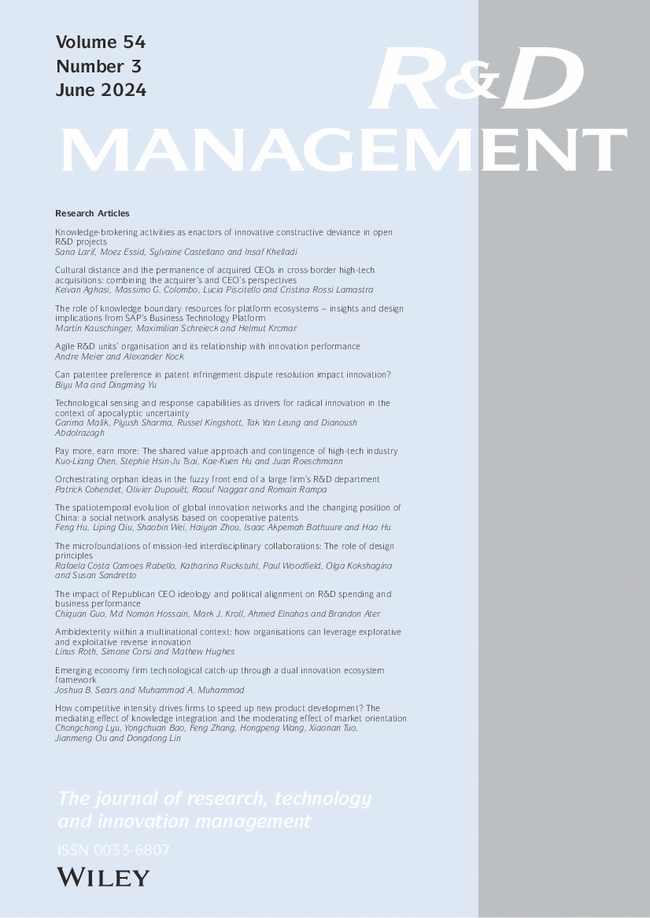Maker movement contribution to fighting COVID‐19 pandemic: insights from Tunisian FabLabs
IF 5.7
2区 管理学
Q1 BUSINESS
引用次数: 15
Abstract
COVID‐19 is an unexpected and brutal pandemic that requires new innovation models to overcome the constraints of this crisis and address its multiple challenges. Open innovation does not replace a traditional closed R&D model; but in the current crisis situation, it can support an ecosystem stakeholders’ effort by leveraging several collaborations. Based on the Tunisian experience, this study illustrates how a crisis can spontaneously create these collaborations between the maker’s community, the users (public healthcare professionals) and key stakeholders (universities, civil society and the private sector among others). To investigate this research question, we adopted a qualitative approach based on a single embedded case study and collected data through participant observation technique. The case study describes a process of crisis‐driven innovation based on 3D printing technologies in order to provide personal protective equipment (PPE) to healthcare professionals. It highlights two distinct phases describing the evolution from a local collaborative model to the creation of a national ecosystem able to design, manufacture and address the growing need of the public healthcare system. Our findings show with empirical evidence the crucial roles played by the makers’ community, FabLabs and engineers in the fight against the COVID‐19 pandemic. This study draws lessons on how a large health crisis can trigger national crisis‐driven innovation (CDI) initiatives, which helped structure the makers’ network and promote collaboration towards a common national goal. A collaborative framework for CDI initiated by the Tunisian makers’ community is proposed in this study and could be adopted in similar crisis contexts, in Global South and North settings.创客运动对抗击COVID - 19大流行的贡献:来自突尼斯FabLabs的见解
COVID - 19是一场意想不到的残酷大流行,需要新的创新模式来克服这场危机的制约因素并应对其多重挑战。开放式创新不能取代传统的封闭式研发模式;但在当前的危机形势下,它可以通过利用多个合作来支持生态系统利益相关者的努力。根据突尼斯的经验,本研究说明了危机如何自发地在制造者社区、用户(公共卫生专业人员)和关键利益相关者(大学、民间社会和私营部门等)之间建立这些合作关系。为了探讨这一研究问题,我们采用了基于单一嵌入式案例研究的定性方法,并通过参与式观察技术收集了数据。案例研究描述了基于3D打印技术的危机驱动创新过程,以便为医疗保健专业人员提供个人防护装备(PPE)。它强调了两个不同的阶段,描述了从地方协作模式到创建能够设计、制造和解决公共医疗系统日益增长需求的国家生态系统的演变。我们的研究结果以经验证据表明,创客社区、FabLabs和工程师在抗击COVID - 19大流行中发挥了关键作用。本研究总结了大型卫生危机如何触发国家危机驱动创新(CDI)举措的经验教训,这些举措有助于构建制造者网络并促进朝着共同的国家目标开展合作。本研究提出了突尼斯创客社区发起的CDI合作框架,可以在类似的危机背景下,在全球南方和北方的环境中采用。
本文章由计算机程序翻译,如有差异,请以英文原文为准。
求助全文
约1分钟内获得全文
求助全文
来源期刊

R&D Management
Multiple-
CiteScore
11.30
自引率
9.50%
发文量
0
期刊介绍:
R&D Management journal publishes articles which address the interests of both practising managers and academic researchers in research and development and innovation management. Covering the full range of topics in research, development, design and innovation, and related strategic and human resource issues - from exploratory science to commercial exploitation - articles also examine social, economic and environmental implications.
 求助内容:
求助内容: 应助结果提醒方式:
应助结果提醒方式:


